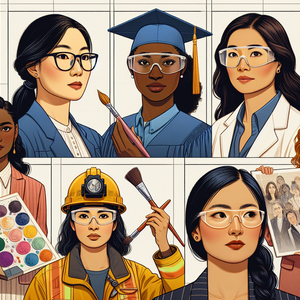Women in Trade: Breaking Stereotypes

In recent years, there has been a noticeable increase in the number of women entering trade professions. According to the National Association of Women in Construction (NAWIC), women make up approximately 10% of the construction workforce in the United States, a number that has been gradually rising. This increase can be attributed to various factors, including targeted outreach programs, support networks, and changing societal attitudes towards gender roles in the workforce. Trade schools and vocational training programs are also adapting to this increasing interest. Many institutions are implementing programs tailored specifically for women, thereby fostering an environment where female students feel empowered to explore and excel in trades. In addition, initiatives by organizations such as the Women in Trades Initiative are providing resources, mentorship, and networking opportunities to help women navigate their careers in skilled trades.
Inspiring Female Professionals
Women like Jennifer O’Connell, a master plumber from New York, and Amanda McMillan, a skilled electrician in Texas, are leading the way in their respective fields. O’Connell, who runs her own plumbing business, faced skepticism when she first entered the industry. However, through determination and skill, she has not only proven her abilities but also become a mentor for aspiring female plumbers, showcasing the importance of representation in these fields. Similarly, Amanda McMillan has been vocal about her passion for electrical work, often sharing her experiences on social media to encourage young women to explore trade careers. Her platform has become a source of inspiration and information, helping to demystify the trade profession for young girls. These women, among many others, are reshaping industry norms and demonstrating that skills and dedication are not dictated by gender. Their stories serve as powerful reminders that diversity in trade professions leads to innovation and a richer work environment.
Challenges Faced by Women in Trades
Despite the progress, women in trade professions still encounter numerous challenges. One of the most significant barriers is the entrenched stereotype that trades are 'men's work.' This can lead to a lack of support from peers, inadequate mentorship, and sometimes even discrimination on the job site. According to a report by the U.S. Department of Labor, women in skilled trades often experience a 'bro culture' that can be unwelcoming and intimidating. Moreover, the physical demands of many trade jobs can deter women from pursuing these careers. The perception that trade jobs are too physically challenging can create self-doubt among women and discourage them from entering the field. However, initiatives aimed at improving workplace conditions and promoting physical training specifically tailored for women are beginning to emerge, helping to bridge the gap. Companies are also recognizing the importance of diversity and are implementing training programs that foster inclusive environments.
Encouraging Future Generations
Organizations and educational institutions are taking proactive steps to encourage more women to consider trade careers. Programs such as Girls Who Code and the Women in Trades Initiative focus on providing young girls with hands-on experience and exposure to various trade skills. Schools are also beginning to incorporate trade education into their curriculums, allowing students to explore these options early on. The visibility of women in trades serves as a powerful inspiration for future generations. When young girls see female role models thriving in skilled professions, it helps to dismantle stereotypes and encourages them to pursue their passions without fear of judgment. Workshops, mentorship programs, and community outreach events are crucial for fostering interest and providing support to young women considering careers in trades.
The rise of women in trade professions is not just a trend; it is a movement that is reshaping the landscape of skilled labor. As women like Jennifer O’Connell and Amanda McMillan continue to break barriers and inspire others, the industry is becoming more inclusive and diverse. By supporting these trailblazers and encouraging future generations to explore trade careers, we can create a workforce that truly reflects the values of equality and opportunity. The journey is ongoing, and while challenges remain, the progress made thus far is a testament to the strength and resilience of women in trades. The commitment to fostering an inclusive environment in trade professions not only benefits women but also enriches the entire industry. As society continues to embrace the idea that skills know no gender, we can look forward to a future where women thrive in every aspect of trade professions.
Electrician Apprentice
Local electrical companies, construction firms, utility companies
Job Description
Assist licensed electricians with installation, maintenance, and repair of electrical systems in residential and commercial settings.
Learn to read blueprints, follow safety protocols, and use various tools and equipment safely.
Required Skills
Basic understanding of electrical systems
Problem-solving skills
A willingness to learn
Plumbing Technician
Plumbing service companies, municipal water departments, construction firms
Job Description
Perform routine maintenance and repairs on plumbing systems, including installation of fixtures and troubleshooting leaks.
Interact with customers to provide estimates and explain services, ensuring customer satisfaction.
Required Skills
Strong mechanical aptitude
Customer service skills
Knowledge of plumbing codes and regulations
Welder (Specializing in TIG Welding)
Aerospace companies, automotive manufacturers, metal fabrication shops
Job Description
Execute precision welding tasks using TIG (Tungsten Inert Gas) techniques on various metals, including stainless steel and aluminum.
Interpret technical drawings and work with fabrication teams to produce high-quality components for manufacturing.
Required Skills
Proficiency in TIG welding
Attention to detail
An understanding of metallurgy
Construction Project Manager
General contracting firms, construction management companies, real estate developers
Job Description
Oversee construction projects from inception to completion, coordinating teams and ensuring projects are delivered on time and within budget.
Manage contracts, budgets, and schedules, while maintaining compliance with safety regulations and quality standards.
Required Skills
Strong leadership
Communication skills
Experience in project management software
HVAC Technician
HVAC companies, property management firms, government facilities
Job Description
Install, maintain, and repair heating, ventilation, and air conditioning systems in residential and commercial buildings.
Diagnose issues and provide solutions to ensure systems operate efficiently and comply with local regulations.
Required Skills
Knowledge of HVAC systems
Troubleshooting skills
Certification in refrigerant handling


